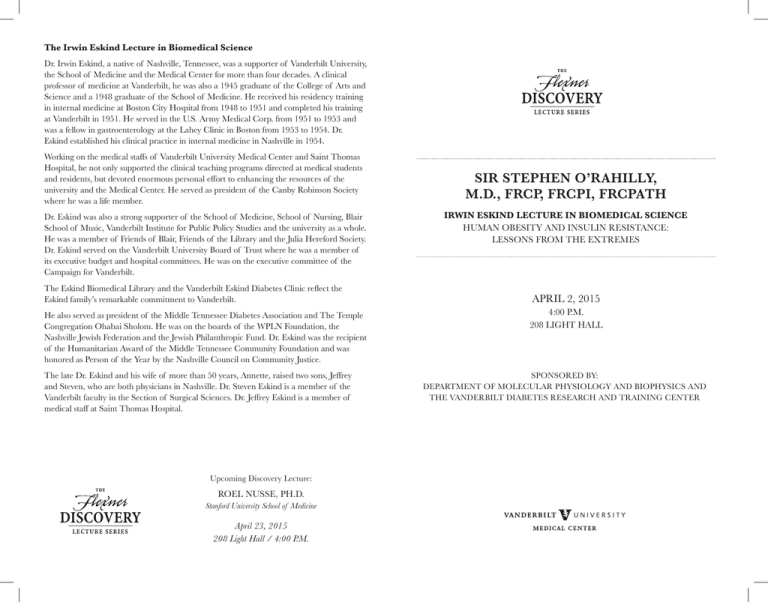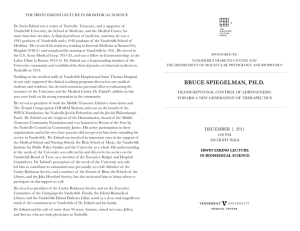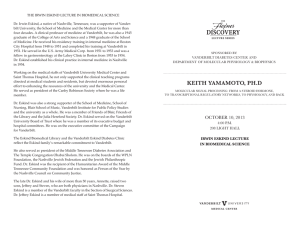The Irwin Eskind Lecture in Biomedical Science
advertisement

The Irwin Eskind Lecture in Biomedical Science Dr. Irwin Eskind, a native of Nashville, Tennessee, was a supporter of Vanderbilt University, the School of Medicine and the Medical Center for more than four decades. A clinical professor of medicine at Vanderbilt, he was also a 1945 graduate of the College of Arts and Science and a 1948 graduate of the School of Medicine. He received his residency training in internal medicine at Boston City Hospital from 1948 to 1951 and completed his training at Vanderbilt in 1951. He served in the U.S. Army Medical Corp. from 1951 to 1953 and was a fellow in gastroenterology at the Lahey Clinic in Boston from 1953 to 1954. Dr. Eskind established his clinical practice in internal medicine in Nashville in 1954. Working on the medical staffs of Vanderbilt University Medical Center and Saint Thomas Hospital, he not only supported the clinical teaching programs directed at medical students and residents, but devoted enormous personal effort to enhancing the resources of the university and the Medical Center. He served as president of the Canby Robinson Society where he was a life member. Dr. Eskind was also a strong supporter of the School of Medicine, School of Nursing, Blair School of Music, Vanderbilt Institute for Public Policy Studies and the university as a whole. He was a member of Friends of Blair, Friends of the Library and the Julia Hereford Society. Dr. Eskind served on the Vanderbilt University Board of Trust where he was a member of its executive budget and hospital committees. He was on the executive committee of the Campaign for Vanderbilt. The Eskind Biomedical Library and the Vanderbilt Eskind Diabetes Clinic reflect the Eskind family’s remarkable commitment to Vanderbilt. He also served as president of the Middle Tennessee Diabetes Association and The Temple Congregation Ohabai Sholom. He was on the boards of the WPLN Foundation, the Nashville Jewish Federation and the Jewish Philanthropic Fund. Dr. Eskind was the recipient of the Humanitarian Award of the Middle Tennessee Community Foundation and was honored as Person of the Year by the Nashville Council on Community Justice. The late Dr. Eskind and his wife of more than 50 years, Annette, raised two sons, Jeffrey and Steven, who are both physicians in Nashville. Dr. Steven Eskind is a member of the Vanderbilt faculty in the Section of Surgical Sciences. Dr. Jeffrey Eskind is a member of medical staff at Saint Thomas Hospital. Upcoming Discovery Lecture: ROEL NUSSE, PH.D. Stanford University School of Medicine April 23, 2015 208 Light Hall / 4:00 P.M. SIR STEPHEN O’RAHILLY, M.D., FRCP, FRCPI, FRCPATH IRWIN ESKIND LECTURE IN BIOMEDICAL SCIENCE HUMAN OBESITY AND INSULIN RESISTANCE: LESSONS FROM THE EXTREMES APRIL 2, 2015 4:00 P.M. 208 LIGHT HALL SPONSORED BY: DEPARTMENT OF MOLECULAR PHYSIOLOGY AND BIOPHYSICS AND THE VANDERBILT DIABETES RESEARCH AND TRAINING CENTER SIR STEPHEN O’RAHILLY M.D., FRCP, FRCPI, FRCPATH CO-DIRECTOR, IMS; DIRECTOR, UNIVERSITY OF CAMBRIDGE METABOLIC RESEARCH LABORATORIES; DIRECTOR, MRC METABOLIC DISEASES UNIT PROFESSOR OF CLINICAL BIOCHEMISTRY AND MEDICINE, UNIVERSITY OF CAMBRIDGE HUMAN OBESITY AND INSULIN RESISTANCE: LESSONS FROM THE EXTREMES The genetic component of quantitative metabolic traits is complex with a mixture of common alleles of small effect and rarer alleles of larger effect. We have principally focused on finding the latter through the study of extreme human phenotypes of obesity and insulin resistance, including lipodystrophy. By applying both candidate and hypothesis-free genetic approaches we have identified multiple different genetic variants that cause highly penetrant forms of these diseases. Through detailed phenotypic studies in humans and relevant murine and cellular models, these disorders continue to provide new insights into the physiology and pathophysiology of energy balance and metabolism. DEPARTMENT OF CLINICAL BIOCHEMISTRY, UNIVERSITY OF CAMBRIDGE MEMBER, NATIONAL ACADEMY OF SCIENCES MEMBER, ROYAL SOCIETY, UK Stephen O’Rahilly is Professor of Clinical Biochemistry and Medicine at the University of Cambridge and Honorary Consultant Physician at Addenbrooke’s Hospital. He led the establishment of the Institute of Metabolic Science, which he now co-directs. He is Scientific Director of the Cambridge NIHR Biomedical Research Centre. He qualified in Medicine from University College Dublin and undertook post-graduate training in London, Oxford and Boston before setting up his laboratory in Cambridge in 1991. He has sought to better understand the molecular mechanisms leading to diabetes, obesity and related metabolic and endocrine disorders. He remains active in clinical practice and in the teaching of medical students. He has won many national and international awards including the Heinrich Wieland Prize, the Inbev Baillet Latour Prize and the Zülch Prize. He was elected to the Royal Society in 2003, a Foreign Associate of the National Academy of Sciences USA in 2011 and is an Honorary Member of the German Society for Internal Medicine. He was appointed a Knight Bachelor in 2013.


